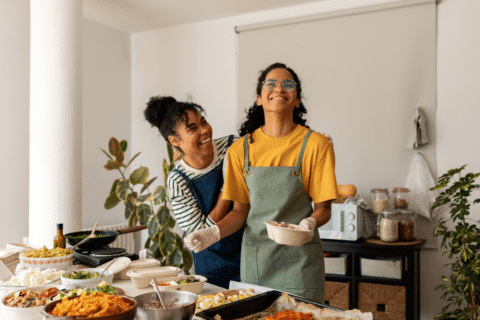What end of life planners have learned from the pandemic
5 ways COVID-19 has changed how we think about the inevitable

Death was already an inevitable part of life, one that people rarely like to talk about — and then the pandemic happened. We had no choice but to confront our mortality as an unknown virus spread across the world, upending life as we knew it.
Data shows that the pandemic has changed many of our behaviors, especially when it comes to end of life planning. For example, savings rates went through the roof during the pandemic, which isn’t a surprise since so many people were laid off (or at risk of getting laid off) when the country shut down.
But how have attitudes and customs changed related to health care, death, and funerals? We spoke with experts in the end-of-life field — the so-called last responders who, after all, have witnessed the full effects of the deadly virus — to learn what has changed in regards to life care and other advance planning expenses since the pandemic hit.
In this article:
More people are planning for death
The fragility of life is now at the forefront of our minds, and more of us are actively planning for its end. “People have become hyper-focused on getting their affairs in order and have realized more now than ever before that tomorrow is never promised,” said Jaclyn Strauss, a CPA and creator of My Macro Memoir®, a digital binder where you can store important information including information you want to leave behind to loved ones.
Not talking about death could leave you (or someone you love) scrambling to settle life planning affairs while grieving, which can be less than ideal. Now instead of seeking out estate attorneys only after someone passes, younger people are seeking estate planning services to make sure they know where certain documents are before people die, according to Strauss. This type of life care planning is very practical and can help a loved one with decision making in the future.
“However, there is always human nature that has provided us with ‘short memory’ syndrome. I hope that people do not revert to the pre-COVID ways of shying away from getting organized and prepared for end-of-life.”
Cremation rates are increasing at a rapid pace
During the pandemic, more than half of funeral directors reported an increase in cremation rates, according to a 2020 survey by the National Funeral Directors Association (NFDA). For 2020, the estimated burial rate was 37.5%, while the cremation rate was a whopping 56%.
“Cremation had already become more common than burial a few years ago, but without the ability to have a traditional funeral during [the pandemic], even more people turned to cremation,” said Alison Johnston, CEO and co-founder of Ever Loved, a website that helps families plan and pay for funerals.
"However, there is always human nature that has provided us with ‘short memory’ syndrome. I hope that people do not revert to the pre-COVID ways of shying away from getting organized and prepared for end-of-life."
—Jaclyn Strauss
The cost of cremation versus burial could be a major reason for its popularity over the years. Just take a look at the price tag: An average viewing and burial cost $7,640 to $9,135 in 2019. In comparison, the average viewing and cremation cost $5,150 in the same year. Choosing cremation when organizing your life care planning could relieve some financial burden for family and other loved ones you leave behind.
Small funeral services are popular — but that might not last
Social events were scaled back or postponed during the pandemic. Experts are up in the air about whether small funerals will still be common, but they believe intimate affairs may stick around for at least a while longer until the pandemic is fully in our rearview.
“I don’t think that big funerals are a thing of the past, but small funerals continue to be a trend, partially due to some families hesitant about unvaccinated family members coming to exposure with the virus due to travel, and partially due to the increasing demand surrounding work life,” said Gabby Martin, a supervisor at Bio Recovery, a company that empathetically provides bio cleaning services.
Demand for labor is high as some companies struggle to find workers. Those who return to work in close proximity to other people may be hesitant to attend major events with family members since it could put them at risk. Until more of the population is vaccinated and COVID-19 variants numbers reduce, people may continue to be hesitant about large gatherings.
People are memorializing loved ones in new ways
During the pandemic, we got creative out of necessity. “As people worked around health care concerns and restrictions during [the pandemic], families came up with tons of innovative ways to hold a memorial, from Zoom memorials to gathering in a favorite park,” said Johnston. This allows loved ones to celebrate the life of a person without doing traditional funeral arrangements.
An advantage of that creativity is that we’ve learned that physical presence isn’t required to attend a special occasion. Johnston said it’s now common to provide a way for people to live stream service from home and watch it later, even when there is a large in-person service. Johnston predicts this will continue since being able to video stream a funeral makes a lot of sense.
Another tradition that Martin has noticed is that annual memorial rituals seem to be increasing in popularity. Instead of having one major celebration, people are finding ways to memorialize and celebrate loved ones on an ongoing basis, which could also continue after the pandemic.
"As people worked around health care concerns and restrictions during [the pandemic], families came up with tons of innovative ways to hold a memorial, from Zoom memorials to gathering in a favorite park."
—Alison Johnston
Online shopping for caskets is a thing
You can buy groceries and toilet paper (and even life insurance) online, but did you know you can also buy caskets online? Another byproduct of people becoming more tech-savvy during the pandemic with their end of life planning is that it’s changing the way people plan and organize their funeral arrangements, according to Johnston.
“More people than ever are booking cremations online, buying caskets online, and creating memorial websites for their loved ones.” Funeral and advance care planning of the future could be more like shopping on Amazon. So, if you prefer not to take a trip to the funeral home, you have other options.
Death is a challenging topic to talk about, but you can’t avoid it
The pandemic may have started conversations at the dinner table about death, and that’s not necessarily a bad thing. It’s inevitable and writing your will, purchasing life insurance, and drafting a power of attorney document can ensure your loved ones are provided for and know what to do when you’re gone.
The good news is that much of the planning you can now do digitally. For example, you can apply for life insurance online and at a low cost within a few minutes. Once you have an end-of-life plan, you can rest assured knowing your bases are covered in case something happens to you.

About Taylor Medine
Taylor Medine is a personal finance writer who's covered all things money for the last six years. Her work has appeared on Business Insider, Credit Karma, MSN, USA Today, and much more.
Read more by Taylor MedineOur editorial policy
Haven Life is a customer-centric life insurance agency that’s backed and wholly owned by Massachusetts Mutual Life Insurance Company (MassMutual). We believe navigating decisions about life insurance, your personal finances and overall wellness can be refreshingly simple.
Our editorial policy
Haven Life is a customer centric life insurance agency that’s backed and wholly owned by Massachusetts Mutual Life Insurance Company (MassMutual). We believe navigating decisions about life insurance, your personal finances and overall wellness can be refreshingly simple.
Our content is created for educational purposes only. Haven Life does not endorse the companies, products, services or strategies discussed here, but we hope they can make your life a little less hard if they are a fit for your situation.
Haven Life is not authorized to give tax, legal or investment advice. This material is not intended to provide, and should not be relied on for tax, legal, or investment advice. Individuals are encouraged to seed advice from their own tax or legal counsel.
Our disclosures
Haven Term is a Term Life Insurance Policy (DTC and ICC17DTC in certain states, including NC) issued by Massachusetts Mutual Life Insurance Company (MassMutual), Springfield, MA 01111-0001 and offered exclusively through Haven Life Insurance Agency, LLC. In NY, Haven Term is DTC-NY 1017. In CA, Haven Term is DTC-CA 042017. Haven Term Simplified is a Simplified Issue Term Life Insurance Policy (ICC19PCM-SI 0819 in certain states, including NC) issued by the C.M. Life Insurance Company, Enfield, CT 06082. Policy and rider form numbers and features may vary by state and may not be available in all states. Our Agency license number in California is OK71922 and in Arkansas 100139527.
MassMutual is rated by A.M. Best Company as A++ (Superior; Top category of 15). The rating is as of Aril 1, 2020 and is subject to change. MassMutual has received different ratings from other rating agencies.
Haven Life Plus (Plus) is the marketing name for the Plus rider, which is included as part of the Haven Term policy and offers access to additional services and benefits at no cost or at a discount. The rider is not available in every state and is subject to change at any time. Neither Haven Life nor MassMutual are responsible for the provision of the benefits and services made accessible under the Plus Rider, which are provided by third party vendors (partners). For more information about Haven Life Plus, please visit: https://havenlife.com/plus



